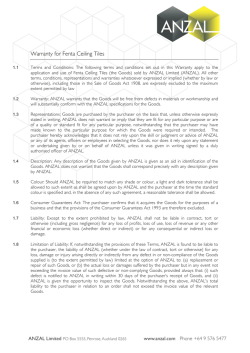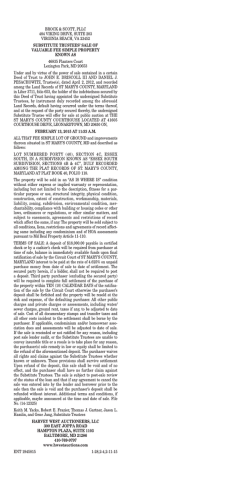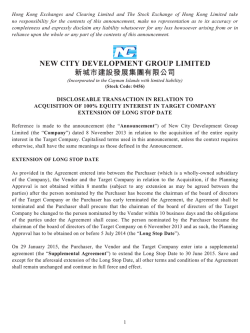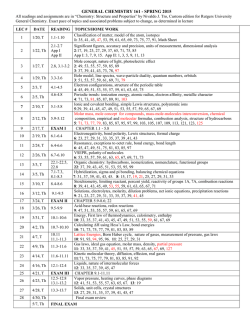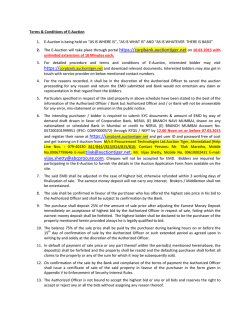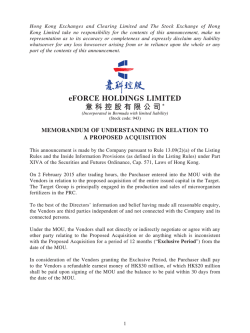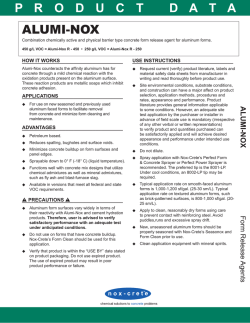
General Info Regarding Sale Agreements
GENERAL NOTES ON COMPLETION AND UNDERSTANDING OF DEED OF SALE ( OFFER TO PURCHASE) NR. 1 DESPRIPTION OF PARTIES 1.1 PARTIES MARRIED IN COMMUNITY OF PROPERTY I.t.o Alienation of Land Act either spouse can sign the Offer to Purchase for the acquisition of immovable property and thereby bind the joint estate, however in order to effect the transfer both parties must sign the transfer documents. To sell the property, either spouse may sign the Offer to Purchase with the written consent of the other spouse, but both must sign the transfer documents. Thus: rather always get both spouses to sign the Offer to Purchase to buy or sell immediate property. 1.2 DIVORCEES WHO WERE MARRIED IN COMMUNITY OF PROPERTY If the immoveable property was acquired before or after the date they got married in community of property, the property is automatically an asset in the joint estate whether it is registered in the Deed Office on one or both parties’ names and therefore both parties must sign the Offer to Purchase and transfer documents even if they are divorced. If they are divorced they are described as: 1. SIPHO KIBI Identity Number ….. Unmarried 2. SALLY KIBI Identity Number …… Unmarried Even if one of the divorced spouses got married in the meantime in community of property with spouse nr. 2 then the immoveable property which was formally an asset of the joint estate of his first marriage, can only be sold if all three parties sign the Offer to Purchase and transfer documents as follows: 1. SIPHO KIBI Identity Number ……. and DOROTHY KIBI…..(new wife) Identity Number ……… Married in community of property to each other And 2. SALLY KIBI……. (ex-wife) Identity Number …….. Unmarried 1.3 PARTIES MARRIED IN TERMS OF CUSTOMARY MARRIAGES I.t.o the Recognition of Customary marriages Act of 1998, a customary marriage conducted after 15 November 2000 (date of commencement of the act) is automatically regarded as in community of property I.t.o the Gumede v Pres. Of Rep of SA case the court found that sections of the aforesaid act that said that the act is not applicable to marriages before 15 November 2000 is unconstitutional and invalid. Thus, all customary marriages are regarded as being in community of property. 1.4 ESTATES Should the Seller’s Estate sell his property, then a duly appointed Executor / Administrator by the Master of the High Court must sign the Offer to Purchase and all transfer documents. When the purchase price is less then R125 000.00 a Letter’s of Authority is sufficient and the Power of Attorney is endorsed i.t.o Section 18(3)of the Administration of Estates Act 66 of 1965, alternatively, when the purchase price is higher than R125 000.00 then we need a Letter of Executorship and the Power of Attorney is endorsed i.t.o Section 42(1). If the property is first transferred to the heirs and then to the Purchaser of the heir, no endorsement is required but the sale of the property will thus result in two transfers resulting in more cost. * 1.5 MINORS When a minor is selling the property, both guardians must assist in signing the Offer to Purchase and transfer documents. When a minor is buying cash, only one guardian needs to sign the Offer to Purchase and transfer documents but when a bond is taken up, both guardians must sign the bond documents. The Master of the High Court must consent to the alienation of a minor’s property less than R100 000.00 and if more, the High Court must consent. Majority status is attained at 18. 1.6 REPRESENTATIVES I.t.o the Alienation of Land Act,the written authority of a representative/ agent is required when a OTP is signed. Thus before someone can sign on behalf of another they need a Power of Attorney, either General or Special. Persons signing for Trust, CC or Co must have the authority to bind the entity. The contract can be invalid if no one queried the authority of the person signing and if the person signing on behalf of the entity does not warrant his authority. If it appears later that he did not have authority then the contract can be declared invalid. But, if the person signing is lying about his authority and warrants that he is authorised then that contract can be upheld. Therefor it is best of the person signing writes after his signature” who warrants that he is authorised to bind the Trust/ Co/ CC. The members or directors of Co/CC can ratify an agreement where property is bought or sold- that is afterwards confirm that they agree with the transaction. However, in the case of the trust that cannot be done and all the trustees must either sign the OTP or a resolution must be provided not older than the date of the OTP authorising the sale. A property cannot be bought in the name of a trust to be formed. If the trust is formed later than the date of the OTP then SARS can regard the transaction as a double transaction- first to the person acting on behalf of the “trust” and then from that person to the trust with the result that transfer duty has to be paid twice. You can however, buy a property in the name of the CO or CC to be formed. In such circumstances it is custom to include a clause that should the Co or CC not be formed in ie 30 days that the person signing will then be held personally liable. Nr. 2 DESCRIPTION OF PROPERTY: Nr.3 It is imperative that the property to be sold be described properly. If there is any uncertainty as to the property to be sold, the contract can be declared invalid. In the case of an erf- the erf number and the area as registered in the deeds office must be inserted. It is always safer to also insert the street address to avoid any uncertainty although the omittance of either the erf description or the street address in itself will not have the result that the contract is invalid as long as there is certainty between the parties. In the case of a sectional title unit always ensure that you insert the correct unit number as well as the section number which can differ from the unit number and also insert the description of any exclusive use areas being sold, ie. Garage areas, parking bays, garden areas, etc. PAYMENT OF THE PURCHASE PRICE: Should the Purchaser be paying a deposit, it is important that the moneys be available at the date inserted in the deed of sale. If the moneys are in a money market scheme or is coming from a policy or shares, etc, the purchaser must know that should he not be able to pay the moneys at the Conveyancer at the date as stipulated in the deed of sale, he will be held in breach of contract. If the deposit is being paid from the sale of the Purchasers’ property, this fact must be stated as such either in the deposit clause or in the special conditions at the end of the contract. The balance of the purchase price is normally the amount payable by the mortgage bond but should the Purchaser at a later stage pay a further deposit this must be set out as such. Even if the Purchaser is taking up a bond, a guarantee for provision of the balance of the purchase price still has to be provided. This is issued by the Conveyancer attending to the mortgage bond on signature by the Purchaser of the bond documents. It is therefore important to insert that the guarantee be issued within eg. 10 days of bond approval. This will provide sufficient time for the bond attorneys to receive the bond instructions after the bond has been approved, to prepare the bond documents and to attend on the Purchaser for signature thereof. Should the bond therefore be approved, and the Purchaser fail or refuse to sign bond documents, he will be held in breach of contract. Nr. 4 WHEN IS A CONTRACT INVALID? * In terms of the Alienation of land act, all material terms applicable to a sale of immovable property must be in writing, namely a full description of the land sold, the identity of the parties to the contract and the purchase price. If any of these material terms are not specifically provided for in the written document which is signed by the contracting parties or the persons authorised by such contracting parties in writing, the contract is void and unenforceable. Nr. 5 - 5.1 BOND APPROVALS A bond clause is 99% of the cases formulated as a suspensive condition.Therefor the is no binding contract until such time when the bond is approved- and if not approved the contract lapses automatically.The Purchaser is not in breach. A bond clause can also be worded as an Ordinary condition. The same as any other guarantee or deposit clause. This mean that even if the Purchaser does not obtain a bond, the contract will still be enforceable and should the Purchaser not qualify for the bond he will be held in breach of contract. This is quite dangerous for any Purchaser and is normally only done if the Purchaser in any event wanted to buy cash but wants to register a bond over the property for his own use. A deposit or guarantee clause is normally not a suspensive condition and therefore the contract is enforceable from the start and should the Purchaser not pay the deposit or guarantee, he will be held in breach of contract, a letter of demand can be sent to him and the normal breach clauses can be enforced. If the Purchaser by his actions, and on condition that the Seller can proof it, frustrates the obtaining of a bond, then the seller can sue the Purchaser for performance as if the bond was approved, on the ground of the doctrine of fictional fulfilment. It is important to note that should the bond not be approved by the date stated in the contract or for the amount stated in the contract, then an addendum for extension of the time or for reduction of the bond amount must be signed by both parties prior to the date mentioned in the contract otherwise the contract is null and void and cannot be revived. The exception is when the wording of the contract says that the Seller can automatically grant a further extention or where the Purchaser can decide whether he will accept a lower bond and pay a higher deposit. Once the contract has lapsed you must either sign a new OTP by both parties or do an Agreement as follows: “The parties contract with one another on exactly the same terms and conditions contained in the Deed of Sale annexed hereto save for Clause X dealing with the bond approval which shall read as follows: The agreement is subject to the Purchaser obtaining a mortgage loan in the amount of Rx which has already been granted by y bank and accepted by the Purchaser or the Purchaser shall have until….. to obtain a bond in the sum of Ry.” 5.2 SUBJECT TO SALE OF PURCHASER’S PROPERTY If the OTP contains a suspensive condition that the Purchaser must first sell his property before a certain date mentioned in the deed of sale at a certain price, then the OTP is only enforceable and binding once that condition is met. Should the property then not be sold by the mentioned date at the mentioned place you can either obtain an addendum for extension signed by both parties prior to the said date or else you have to either have a new OTP signed or an agreement signed as set out in the above example. If the Purchaser sold his property at a lower price than what was stated, you still have to do the addendum. Nr. 6 OCCUPATIONAL RENT AND OCCUPATION DATE Should the Purchaser take occupation prior to registration he must pay occupation rent from the occupation date. It is important to agree on an amount even if the Purchaser does not intent on taking occupation prior to registration for they parties can always later agree on an earlier date and then at least the amount has been agreed upon. Should the Seller stay on in the property after registration, the Seller will be liable to pay the occupational rent to the Purchaser. This amount is normally payable at the Conveyancer’s office who will refund either party on registration should rent be paid for a longer period than what was anticipated. Should the agreement not contain any details on occupation date or rental payable and not be aware of subsequent addendums, then the Conveyancer will not be held accountable for unpaid rent. Nr.7 BREACH OF CONTRACT OR VOID CONTRACT Should a contract contain suspensive conditions, eg. The approval of a bond or the selling of the purchasers property, and the conditions are worded as such, that is, that the contract will only come into existence once the conditions have been met, then the non-fulfillment will result in the contract being void ab initio. This means that none of the parties can claim any damages for “cancellation” and the agent are not entitled to any commission. Should however, the suspensive conditions be met and thereafter one of the parties fail or refuse to adhere to any other term in the contract, for instance, failure to sign documents, failure to pay cost, failure to provide guarantees, then this party can be held in breach of contract by notice sent in terms of the breach clause of the contract and the innocent party will be entitled to the relief as set out in the remedy clause of the contract, ie. Damages or enforcement of the contract. Nr. 8 VAT OR TRANSFER DUTY The main question is whether the Seller is registered for Vat or not. If the Seller is registered for Vat then Vat is always payable unless the transaction is zero rated. If Vat is payable then transfer duty is not. You never pay transfer duty and Vat. The Law prescribes that the purchase price is deemed to be Vat included. Thus, it is very important to establish whether the Seller is registered for Vat and whether he is aware that from his asking price he will have to pay Vat. If he does not wish to pay, you have to reflect the purchase price as Rx Plus Vat or insert the clause that the Purchaser is liable to pay the Vat. The Conveyancer then obtains the Vat and pay it over to SARS. A transaction is zero rated when the Purchaser and the Seller is registered for vat and the property that is being sold is sold as a going concern or income bearing activity. From the OTP these facts must be evident- the OTP must therefore reflect both parties’ Vat nrs and state that the property is sold as a going concern. If you need certain moveable assets in order to continue with the income bearing activity, then the moveable assets must also be sold in the OTP. For instance, if a farm is sold, the farm equipment must be sold. If a house/ building is sold which was rented out, then the lease agreement will have to be ceded. You have to make provision for who will pay the Vat in the case where SARS( who have the final ruling) does not regard the transaction as zero rated- otherwise the Seller automatically will be liable. When both parties are registered for Vat but the property sold is not sold as a going concern, then the VAT can also be set off. This means that the parties sign an addendum in terms of which the VAT input of the one is set off against the VAT output of the other. When a Purchaser is registered for Vat and the Seller not, the Purchaser still has to pay transfer duty and VAT is still not applicable. In such an instance the Purchaser, as Vat vendor, can claim the transfer duty back from SARS as notional input VAT. When both parties are registered for VAT, and the transaction is not zero rated or set-off is not applied, then the Purchaser can still claim the VAT which he paid back. The Purchaser can however only claim the VAT or transfer duty back if he can proof that the use of the property is directly linked to the income earning activity of the Purchaser and if he can proof that his Vat registration was effective from the date of sale. In other words, even if the Purchaser is not registered at the date of the OTP or at the date of the transfer, he can still register for VAT afterwards but the VAT registration needs to be dated back to at least the date of the sale. Nr. 9 POWER OF ATTORNEYS If you’re the Seller will not be available to accept an offer to purchase or to sign transfer documents, then the Seller must hand you a power of attorney, whether special ( referring to the specific transaction) or general indicating who will accept the offer or sign transfer documents on his behalf. This is similar in the case of a Purchaser. If however, the Seller has passed away by the time the property is sold, then the power of attorney is no longer valid and the executor of his estate must sign the OTP and transfer documents. If the Seller already signed the OTP the executor still needs to sign the transfer documents. If the Seller was of sound mind when he signed the Power of attorney but when the OTP has to sign has become mentally incapacitated, then an application must be made by the High Court to appoint a Curator who must sign the OTP and transfer documents on his behalf. If the Seller is sequestrated, the power of attorney is also no longer valid and only the Administrator of the Seller’s Insolvent estate can sign any OTP and transfer documents. Nr. 10 WHO BEARS THE RISK It is important to note that “occupation” is only the right to enjoy the property. “Possession” is associated with the legal risk in the property and the right to enjoy the benefits of the property. The OTP normally indicates that the Purchaser will take possession and occupation either from a date mentioned prior to registration or from date of registration. If the Purchaser intends to take possession prior to registration he from that date bears the risk in the property and must insure the property from that date. This can be difficult especially if the Purchaser is taking up a bond for then the insurance normally starts from date of registration. It is therefore advisable to insert a clause that the Seller will maintain his insurance on the property pending registration and that any excess payable for damages resulted from date of possession by the Purchaser, will be covered by the Purchaser. If anything breaks on the property prior to registration and the Purchaser has not taken possession then the Seller has to fix it unless the Seller can proof that what caused the breakage was a latent defect that existed at the time of the sale for property in terms of the OTP is normally sold with all defects, latent or patent. There is a high obligation on a Purchaser to properly inspect the property before making an offer and to list all defects to be repaired by the Seller. Otherwise the property is sold voetstoots and the Seller is only liable to repair defects that he gave warranties for, or which arose after the date of sale or if the Purchaser can proof that the Seller was aware of the defect and on purpose fraudulently hided the defect (for instance a mirror hanging over a whole in the wall, or a carpet over a whole in the floor, etc). NR. 11 ELECTRICAL WIRING CERTIFICATE If a OTP does not mention the electrical certificate, the contract is still valid and enforceable. In terms of the Occupational Health and Safety Act, it is law that every consumer of electricity shall have a valid certificate of compliance. A electrical certificate is valid can be transferred from one user to another unless new electrical work has been done on the property since the issue of the same. In order to proof that none electrical work has been done to the property an electrical inspection must be done in which case the electrician in any event will issue a new electrical certificate. The OTP can state that the Seller is in possession of a certificate with a specific date which will be handed to the Purchaser in which case the Purchaser cannot afterwards complain that he does not which to accept that certificate. It is always saver to obtain a new electrical certificate to prevent unnecessary disputes after registration. Nr. 12 RETENTION AND REPAIRS * The Seller is only liable to effect the repairs which he specifically undertook to attend to in the OTP or if the Purchaser can proof that defects or breakages was only incurred after the date of sale but before possession and occupation or before registration. If it is a latent defect or resulted from a latent defect then the Seller is still not liable. If the Purchaser’s bond is approved subject to certain repairs to be effected resulting in a part of the bond being under retention, then the Purchaser is obliged to effect the repairs at his own cost prior to registration of the transfer UNLESS the OTP contains a clause in terms of which the Seller undertook to pay for the same. A bond can normally be registered with a retention and the repairs effected after registration. However the risk in that is that the Purchaser can instruct the bank to release the funds to him and not to the transferring attorney resulting in a short in the purchase price. Should a Conveyancer therefore register with a retention it is adviseable to obtain in writing the consent thereto by both parties, the undertaking by the Purchaser that the retention funds be paid to the transferring attorney and an indemnity by the Seller that should the bank not release the funds to the transferring attorney, that the Conveyancer will not be held liable. It has happened that the banks deduct arrear instalments on the bond from the retention fund also resulting in a short on the purchase price. FICA REQUIREMENTS The Financial institutions has placed a high duty on Estate Agents and Conveyancers to comply with the Financial Intelligence Act. * If a transaction is not cleared for Fica, the Conveyancer may not lodge the bond registration and the transfer in the deeds office. What is required is as follows: NATURAL PERSONS Identity documents, marriage certificates, ANC’s Statement of account not older than three months which is sent to you every month to your physical address, eg, municipal account,cellphone account, medical aid account, telkom account, clothing account, traffic fines, etc. Foreign citizens must favour us with a certified copy of their permanent / temporay residential permit as well as the above documents including the passport. In certain instances the bank will also require an amended salary slip from the Purchaser prior to registration TRUSTS A certified copy of the Letters of Authority and the Trust deed; All trustees have to provide us with the documentation set out under the heading Natural persons Copies of the identity document or birth certificate of the beneficiaries Statement of account reflecting the address of the trust- this can be provided by the auditor or on a letterhead of the trust signed by all trustees Before registration of any bond an updated auditors report which is provided by the bond attorneys need to be stamped and completed by the Auditors A Resolution by the Selling trust or Buying trust authorising the sale or purchase and the registration of the bond- this is prepared by the Conveyancer if not provided by the estate agent CLOSE COPRORATIONS A certified copy of the CK1 or any amended founding statement reflecting the names of all the members; All members have to provide us with the documentation set out under the heading Natural persons Statement of account reflecting the address of the close corporation- this is can be provided by the auditor or on a letterhead of the cc signed by all the members Before registration of any bond an updated auditors report which is provided by the bond attorneys need to be stamped and completed by the Auditors A Resolution by the Selling CC or Buying CC authorising the sale or purchase and the registration of the bond- this is prepared by the Conveyancer if not provided by the estate agent COMPANIES A certified copy of cm 29 , the Certificate to Commence business and the Certificate of Incorporation; All directors have to provide us with the documentation set out under the heading Natural persons Statement of account reflecting the address of the Co.- this can be provided by the auditor or on a letterhead of the Co. signed by all directors Before registration of any bond an updated auditors report which is provided by the bond attorneys need to be stamped and completed by the Auditors A Resolution by the Selling Co. or Buying Co.authorising the sale or purchase and the registration of the bond- this is prepared by the Conveyancer if not provided by the estate agent COST AND EXPENSES The transfer cost and bond cost schedule are enclosed herewith and contains the cost payable by the Purchaser. The Purchasers’ final account will normally include the following items: A. The deposit paid, bond amount received, interest earned on the deposit and occupational rent refund ( if paid in advance beyond registration date). All these items will be reflected on the credit side of the account totalling the moneys received. From this is deducted the following: B. The debits: B.1 Transfer cost ( which includes transfer duty, or Vat on the Purchase price, deeds office fees, deeds search fees, fica fees, post and petties- which are all contained in a pro-forma account provided to the Purchaser on signing of the transfer documents) B.2 Bond registration cost (which includes deeds office fees, deeds search fees, fica fees, post and petties and the banks’ initiation and valuation fees). B.3 Rates and/ or Levies payable to the Municipality and/ or Body Corporate in advance until 30/6 of the year ( for rates) or until the end of the financial year of the Body Corporate. B.4 Occupational interest due B.5 Any additional cost for instance attorney and client fee for settlement agreements, arranging bridging finance ( interest and fees), etc. The Conveyancer will not register the transaction unless this final account balances. The Seller’s account will reflect the following: a. on the credit side the purchase price received, and any moneys due to him by the Purchaser, for instance occupational interest or moveables purchased. b. on the debit side are deducted : B.1 the amount which was paid into the Seller’s outstanding bond account on date of registration of the transfer. Please note that in 99% of the matters this amount is higher than the amount actually due to his bank for the last instalments are not taken into account when guarantees are delivered and the Seller’s bank will thus refund him with that amount. B.2 Bond cancellation cost in the vicinity of R 1500- R 1700 for a single bond which was cancelled. This is payable to the attorney acting on behalf of the bank holding the Seller’s bond. The Conveyancer attending to the transfer gives an undertaking to the other attorney for this amount which are then payable on or before registration of the transfer. B.3 Rates and other Municipal charges paid and/ or outstanding levies paid. B.4 Bridging finance cost and fees in order to arrange pre-payment of rates and/or levies. B.5 B.6 B.7 B.8 Repayment of bridging loans made to the Seller and attorneys fees involved. Any repairs paid or refunded to Purchaser. Any refund on occupational interest due to Purchaser where rent was paid in advance. Cost for wiring certificates and borer beetle certificates. THE CONVEYANCING PROCESS The Conveyancing process is quite a lengthy process with various parties involved. Including the Seller, Purchaser, the Seller’s bank, the Purchaser’s bank, SARSS, Local Municipalities, Body Corporates, the Deeds office, etc. If all the parties do not synchronize, delays are evident. Enclosed is a short set out of the Conveyancing process: Week 1 :A copy of the Deed of Sale is telefaxed or delivered to us by the Estate Agent. :We contact the Seller and Purchaser to obtain copies of Identity documents, Marriage Certificate, Antenuptial Contract, divorce order, death certificate, tax numbers, fica bills or documentation on the trust,cc or company. :We do deedsearch on the property and prepare transfer documents on receipt of the aforesaid info. :If an attachment is registered against the property in the deeds office, we obtain details of the attachment. :We follow up on bond approval of the Purchaser. :We request outstanding rates/levies figures against property :We obtain the bond account number from the Seller of the bond currently registered against property and request from the Seller’s bank the Title Deed and figures to cancel the Sellers bond. Week 2 :Once the Purchaser’s bond is approved, we get Seller to sign documents and bring outstanding documents as previously requested from him/her. Week 3-4 :Once we receive Purchaser’s bond instructions (approximately one week to10 days after the approval) we prepare the Purchaser’s bond documents and get Purchaser to sign transfer and bond documents. :If bond instructions are incorrect (i.e. wrong erf number, wrong interest rate, wrong bond amount) we ask bank for amended instructions and then only can Purchaser sign. :Purchaser need to pay transfer cost and bond costs. Week 5: :Once Purchaser pays transfer cost we can pay SARS for the transfer duty. Only if we have Seller and Purchasers tax numbers. :On receipt of rates figures Purchaser must pay rates in advance to 30 June. :If the Seller owes Nelson Mandela Bay Metropolitan Municipality any funds, the Seller must pay at our offices the said sum, alternatively we arrange bridging finance non behalf of the Seller. :If Purchaser’s cost included in new bond or if Purchaser’s cost to be paid from sale of his property - then we arrange bridging finance for Purchaser. Week 6/8: :We pay SARS and the Nelson Mandela Bay Metropolitan Municipality for clearances and if it is Sectional Title we pay Body Corporate for Levy Certificate. Week 9: We deliver guarantees against Purchasers deposit or Purchasers bond to Seller’s bank’s attorneys for cancellation of Seller’s bond. :We forward our transfer and bond documents to Deeds Office. :Seller’s bank’s attorneys to sent their documents to Deeds Office to link with our documents for the cancellation of the existing bond registered over the property. :If we have to link our transfer with the transfer of the sale of the Purchaser’s old property, we link it in the Deeds Office. Week 10-12: :The Deeds Office take approximately 10 days working days(if no back log) to attend to transfer documents to finalise registration. :We obtain final funds from Purchaser. :We obtain wiring certificate and borer beetle Certificate from Seller ( if applicable), alternatively we arrange the same. :We ensure that all conditions in the contract in example repairs to property are being finalised. On registration: :It takes 2 / 3 days to obtain funds from Purchaser’s bank, to cancel the investment made for Purchaser from the deposit for Purchase Price, to finalise statements for Seller and Purchaser, to pay all parties being: the Seller, the agent, the Sellers bank, the Seller’s bank’s attorney to cancel the Seller’s Bond, the electrical certificate, the borer beetle certificate, the bridging finance institution, the Purchaser any refund, etc. Possible delays: 1. Parties failing to honour appointments to sign documents. 2. Parties not giving us Identity documents etc. and Tax numbers. 3.Seller not giving us bond account number to obtain Title Deed. 4.Missing Title Deeds - We have to obtain Certified copies from Deeds Office with additional cost. 5.Back log or delays with SARS and Nelson Mandela Bay Metropolitan Municipality for figures and Certificates. 6.Purchaser not paying cost. 7.Wrong bond instructions 8.Seller not consenting to arrange wiring certificate, borer beetle certificate,etc. 9.Seller not effecting repairs undertaken in deed of sale THE ACT APPICABLE TO ALL SALES OF PROPERTY: THE ALIENATION OF ALND ACT 68 OF 1981 In summary the Alienation of Land Act 68 of 1981 provides: 1. That contracts for the sale of immovable property or rights in immovable property must be in writing and signed by the parties or their duly authorised representatives in order to be enforceable. The Act therefore is the source of the law in South Africa that verbal agreements for the sale of immovable property are unenforceable. 2. That the material terms applicable to a sale of immovable property must be in writing, namely the description of the land sold, the identity of the parties to the contract and the purchase price. If any one of these material terms are not specifically provided for in a written document which is signed by the contracting parties or persons who are authorised by such contracting parties in writing the contract is void and unenforceable. 3. For the sale of land on instalments defining such a contract as one where land is sold against payment by the purchaser to the seller of an amount of money in more than two instalments over a period exceeding one year. The provisions which govern the sale of land on instalments are intended to cover land used or intended to be used mainly for residential purposes and, inter alia, exclude agricultural land as defined in Section I of the sub-division of Agricultural Land Act 1970. 4. Extensive rules which dictate the contents of a contract for the sale of \and on instalments and the omission of certain clauses and/or information from a deed of alienation can in certain circumstances render the contract unenforceable. 5. In Section 6 and in precise terms the provisions which have to be included in a contract and which are compulsory and no estate agent should attempt to negotiate the conclusion of a contract for the sale of land on instalments without being fully appraised of the legal requirements or being satisfied that the standard contract form being used is in fact a form which complies fully with the provisions of the Act as the consequences of non-compliance can be serious. 6. For special protection to a purchaser under a deed of alienation (a sale of land on instalments) and in summary that protection incorporates: 6.1 The right of a purchaser to take transfer of the land where the seller is rendered insolvent or defaults in terms of any mortgage bond which the seller may have registered over the land. In essence provided the purchaser is in a position to secure payment of the balance of the purchase price which is unpaid there is no risk of loss of the property as would normally be the case in insolvency. 6.2 At any time during the life of the contract the purchaser can demand that the land be transferred to him or her against the registration of a mortgage bond which provides for terms of repayment and interest no more onerous than as are provided for in the deed of alienation. 6.3 Powerful restrictions on the right of a seller to cancel a sale and take back the land. These restrictions are embodied in provisions against cancellation prior to a 30 day written notice of breach delivered in a prescribed manner. In other words the normal common law provisions relating to breach and cancellation of contracts and the standard 7 day notice clause as provided in most deeds of sale or offers to purchase are excluded and purchasers are given serious protection on default. 6.4 The requirement that deeds of alienation are to be recorded in the deeds registry by the seller, or in certain circumstances by the purchaser, and such recordal has the effect of endorsing the title deed of the property and thereby properly protecting a purchaser. The nature of the recordal is similar to that of an interdict which precludes the transfer of the property by the registered owner to any one other than the bona fide purchaser under the deed of alienation and in such a manner gives substance to the protection of the purchaser for which the Act is designed
© Copyright 2026
